Keeping Connected for RV Remote Work
Working remotely while traveling in an RV or boat makes internet not a luxury - but essential. Remote work from an RV or boat requires some additional considerations for creating a redundant and reliable setup.
For many in this category, internet access is more important than water, power, or sewer hook-ups.
Reliable mobile internet access becomes pertinent to making the money needed to keep the nomadic dream alive.
The options for accessing the internet while traveling full-time are quite different than those available while working in a fixed location. It is not going to be anywhere near as easy as just "plugging in" to cable or DSL like you might in your home or office.
What is the BEST mobile internet solution for working remotely from an RV or boat?
The answer: Whatever works best at your current location!
Not the specific 'aha!' answer you were expecting?
The truth is, staying connected using mobile internet takes a bit of work. And remote work ups the urgency.
But, it can be handled. In fact, there are plenty of folks who are currently working remotely while traveling North America as nomads.
The caveat of needing reliable, fast internet access in order to maintain your income and lifestyle puts added pressure on creating a set-up that supports these needs.
Can you get online everywhere, reliably, with high speeds, cheaply? Probably not.
But, being online nearly everywhere and most of the time for an affordable price is within reach.
Staying online while working and traveling is completely doable, if you're willing to plan ahead, be flexible, and build up a solid internet arsenal. Your travel style, your internet needs, and your budget will all be factors in creating a set-up that works to support you.
This guide is meant to give you an overview of the considerations and options for building and refining an internet arsenal that will support your remote work tasks.
If you're a member, please log in above to see your exclusive content.
Don't need a membership? Other ways you can support our work here:
-
As seen in our videos!
-
Get a FREE Month of Starlink!
And our team will get one too!
-
Get a FREE Month of T-Mobile Unlimited Data
Join the Calyx Institute, and get a bonus month - and we do too!
-
Save $20 on Visible
Verizon's prepaid phone plan, we also get a $20 credit.
-
Leave a Tip!
Send our team some beer money!!
-
Share About Us!
Link to our content, tell others about MIRC. It's Free!
It is with huge gratitude to our members for making the free unbiased educational content on our site possible. We're not sponsored, you'll find no 3rd party ads and we don't sell gear or data plans.
Our members get exclusive access to our in-depth content, classrooms, vendor discounts (that can save you more than membership!), alerts, insider info and interactive guidance. They can even book private advising sessions.
If mobile internet is an important part of your lifestyle, consider helping make MIRC possible by joining or supporting our mission.
Working Remotely over RV Mobile Internet Overview
10 Tips for Working Remotely
Before we delve in, consider our Top 10 Tips for mobile internet for working remotely from an RV or boat. We'll dive into these topics (or point you to larger guides that will) later in this guide.
- Redundancy - Always have more than one way to get online.
- Understand the minimum internet requirements for your job.
- Don't depend on public Wi-Fi.
- Understand data plans - and their specific limits.
- Plan your travels around connectivity.
- Don't combine travel days with workdays.
- Have a signal enhancing strategy.
- Judge performance - not bars.
- Have back-up options ready.
- Redundancy. See #1.
RV Mobile Internet for Working Remotely Video
Our video overview of this topic:
Assessing Working Remotely RV Internet Needs
A reality you will face while traveling and working remotely in an RV or boat and needing an internet connection is:
What works best for you in one place, may not work best in the next.
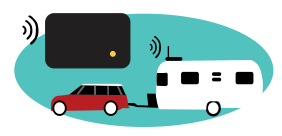 Therefore, there is no singular 'best solution' for all mobile internet situations.
Therefore, there is no singular 'best solution' for all mobile internet situations.
If you're staying in one place for a long period of time, you can find what works best in that location and optimize for it. It's not much different than moving into an apartment or house in a new location.
Mobility, however, presents some unique considerations, especially for those who require an internet connection. If you want or need to move locations fairly often, you need to be prepared for the reality that what works best will change each time you relocate.
For RVers and boaters who don't rely on internet to support their career or income stream, we often suggest starting with the basics and adding on as you need enhancements. However, if internet is essential then we suggest being as prepared as possible - or at least having contingency plans in place when internet access refuses to be had.
On the road, you will be encountering:
- Intermittent and variable connections.
- Varying speeds – from frustratingly slow to blazingly fast.
- Bandwidth caps.
With some planning and flexibility, most challenges of mobile internet can be overcome.
Working Remotely RV Mobile Internet Considerations
We all have different requirements for our mobile internet - from the tasks we need to accomplish to the adventures we want to have. This why is the intersection between affordability, reliability, and flexibility can be evasive.
When considering your mobile internet setup for working remotely from an RV or boat, there are a variety of needs and desires to contemplate:
How do you like to travel?
- Do you yearn to park out in the 'boonies' where no one will come knocking for days? Or are you a city-slicker, preferring to be near to modern conveniences (and also better access to internet)?
- Do you like staying put for months? Or do you move along every few days or weeks?
How Critical is a Constant Connection?
- Do you need to be connected from 9-5?
- Does your line of work allow for breaks in connectivity?
- Do you have scheduled meetings to attend?
- Can you work offline at times and upload work when you are able to get back online?
For more in-depth information on this topic:
Specific Working Remotely RV Internet Requirements
Working remotely has become quite popular and much more embraced by employers. But some employers may see a difference between Working From Home and Working Remotely while Mobile, using a variable internet connection you might encounter in an RV or boat.
Work requirements can dictate the speeds you need to be able to maintain, the amount of data you need to be able to tap into, and the reliability needs of your setup. Some employers may be open to their employees working remotely while mobile from an RV or boat, but may place requirements on the quality of your internet connection or the type of connection that you use.
Wired Internet Requirement
Some remote work situations require a lot of bandwidth, but more importantly, a consistent and reliable connection. It's not uncommon to see a requirement for remote work employees and contractors to have a 'wired' connection. This is particularly common for customer service positions or positions that use a VOIP phone connection.
But what exactly that means, and how flexible the requirement is, is highly variable based on the employer.
- Some may mean you absolutely must be on a verified cable or DSL connection - and will require you to prove it.
- Others may mean they just don't want you using Wi-Fi networking, and instead want you to be physically plugged into an ethernet cable.
- Some may mean they just don't want you using public Wi-Fi sources, and to provide your own connection.
There are ways to convert a wireless data connection to an ethernet connection - but before pursuing that path, make sure you thoroughly understand the requirements of your particular employer.
And do realize that providing a consistent and reliable internet connection while living a mobile lifestyle can be challenging. You may have to make compromises in your travels to meet this need.
Minimum Download/Upload Speeds
 Some things over the internet require minimum speeds - whether dictated to you by an employer, or just by the nature of the beast.
Some things over the internet require minimum speeds - whether dictated to you by an employer, or just by the nature of the beast.
For instance, facilitating video conferencing means you need to maintain fairly consistent 3-4 Mbps down and 1-2 Mbps up speeds (as a minimum!). In many places, this will not be a problem if you have multiple options on board to try and signal-enhancing gear.
If you have requirements to transfer very large files regularly, higher speeds may be necessary.
But there will just be places where you can't get these speeds due to things out of your control - cellular tower congestion, public Wi-Fi variability, network management, too weak of a signal, etc.
Be prepared that needing reliably high speeds while being mobile can mean making compromises in your travels. Plan your high-speed needs for times when you're still in locations with abundant bandwidth (not while actively driving), add time to find a Plan B connectivity option, and have a failover readily available if your current connection drops out.
And definitely do your research in advance when selecting your next location to make sure you'll have the bandwidth you need to get your job done. The frustrating part is that some RVers get all set up in an RV park or location just to find out that they can't get a strong internet signal with their arsenal of gear, and have to move or leave to find a signal that will work for them.
For more on these topics:
Security & Privacy Requirements
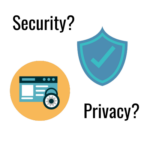 If you're working a job that requires you to handle sensitive information, you'll need to make sure to consider the level of security and privacy needed to keep that information safe.
If you're working a job that requires you to handle sensitive information, you'll need to make sure to consider the level of security and privacy needed to keep that information safe.
Mobile internet security may seem a bit 'scary', but by utilizing basic safety protocols, and more in depth measures like using a VPN or remote server, most tasks can be performed securely if you make sure to be diligent.
For more, in-depth information on this topic:
Redundancy: The Key to RV Mobile Internet Remote Work Success
We've said it before, and we will say it again and again - there is no 'one size fits all' answer to what is the 'best' mobile internet option.
However, we do have a best practice suggestion for anyone who relies on mobile internet daily: Redundancy.
Don't jump out of an airplane without a reserve parachute, and don't try to work online from the road without at least two ways to get online.
Redundancy is having multiple options onboard for gaining internet access. Redundancy is key in building the most reliable mobile internet solution.
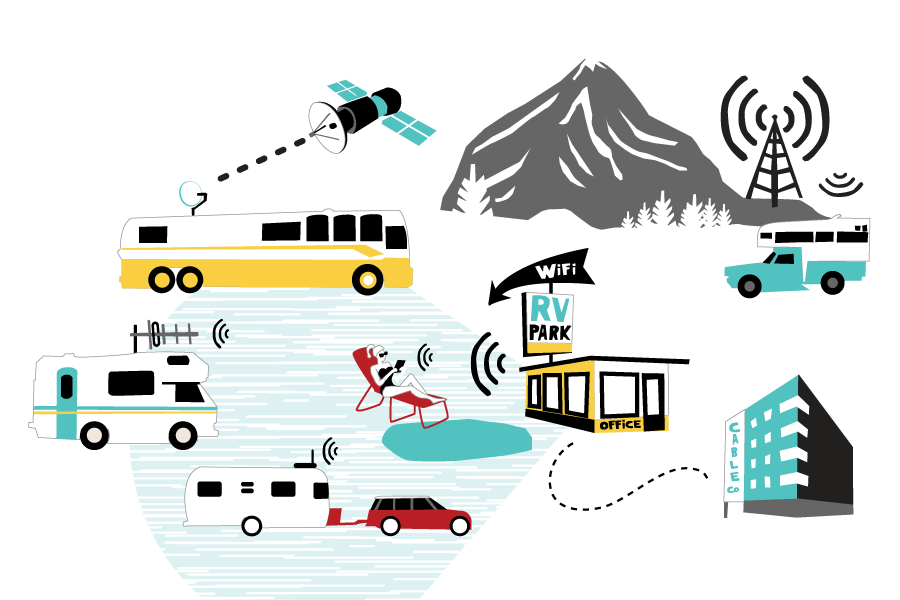
An example of a redundant mobile internet approach:
- Having two or more cellular carriers (or cell carrier + satellite) on board (we often see folks with 3 or more).
- Having multiple options for cellular signal enhancing to optimize the performance (antennas and/or a booster).
- Having back-up equipment in case something fails.
- A device or router that can access public/private Wi-Fi hotspots.
- Openness to seek out a cafe or coffee shop for a little free Wi-Fi with your lunch.
Why is redundancy so important? Think of some of the possible ways your connections might fail you:
- The signal for your main mode of internet connection may be too weak at your current location to utilize.
- You download a firmware update to your mobile internet device that renders it an expensive paperweight.
- You literally drive over your antenna. (Oops)
- A huge RV or boat pulls in next to you and blocks the line of sight to your internet source.
- Mountains and trees make your satellite signal unusable.
- The cellular tower you're connected to may be scheduled for maintenance and go offline right during your critical video conference call.
- Your cellular device could reach its data limit just moments before you get all your files uploaded.
- There's a big event in town, meaning the cellular towers at your current location are painfully overloaded.
- A Tyrannosaurus Rex appears out of nowhere and devours your hotspot. (Ok, maybe not, but...)
For more, in-depth information on this topic:
Public Wi-Fi: Not Ideal
 Often the cheapest, and easiest way to get online is to use public Wi-Fi networks - such as those offered at campgrounds, marinas, and cafes.
Often the cheapest, and easiest way to get online is to use public Wi-Fi networks - such as those offered at campgrounds, marinas, and cafes.
But it may not necessarily be the most reliable or the fastest.
Public Wi-Fi is more often than not summed up in one word: disappointing.
This is especially true if you have high-bandwidth needs for working remotely.
Many campgrounds and marinas advertise free or paid Wi-Fi. Though Wi-Fi has the potential to be extremely fast, many shared Wi-Fi networks are overloaded, causing slow speeds and variable connections.
But, Wi-Fi can be a great tool within your redundant arsenal.
Many libraries, coffee shops, stores, breweries, motels, municipal parks, and even fast-food restaurants also offer free Wi-Fi. There are also plenty of paid Wi-Fi networks to be found, such as Boingo and Xfinity.
For many remote workers, public places with possibly decent Wi-Fi may not be ideal. Will there by lots of background noise like clinking glasses and patrons cheering their favorite sports team while you are on a video conference? Do you have the ability to focus on your work while people at nearby tables catch up on their gossip?
If you're in a location with a library, you might be willing to tote your laptop and set-up for the day. But how long can you go without your full workspace if it includes a large monitor or ergonomic desk?
Security Issues & Public Wi-Fi
Remember that public Wi-Fi spots are just that - public. Who knows what that random stranger sitting next to you is running on their computer?
For those who are dealing with confidential data as part of their daily work (i.e. medical records, accounting), Wi-Fi may not be a great option.
But in some situations, Wi-Fi can be a great solution.
Maybe you'll be driveway surfing. When staying on a friend or relative's property, having access to their Wi-Fi network can be a real treat - if you can reach the network.
Range is a major limitation of Wi-Fi. Most Wi-Fi hotspots fall off to unusably slow connections just a few hundred feet away from the base station. When you do stumble upon a Wi-Fi gem, you'll want to have the ability to access the network from your RV or boat.
This is where Wi-Fi extending gear comes into play.
For More Information:
Cellular Data: Your Likely Choice
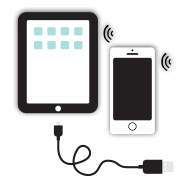 Cellular data is probably the easiest and most accessible option in most places across the USA. Most working nomads depend on cellular data as the core of their mobile internet connectivity.
Cellular data is probably the easiest and most accessible option in most places across the USA. Most working nomads depend on cellular data as the core of their mobile internet connectivity.
Cellular coverage now reaches into some pretty remote places, and coverage maps amongst the major carriers continue to expand.
Cellular is truly mobile, can be extremely fast (sometimes even faster than cable modems!), and is much more secure and reliable than public Wi-Fi hotspots.
Cellular data is most easily shared through hotspotting off of a smartphone. However, when working remotely, you'll probably want to look into a dedicated cellular data device and/or router that would be better suited for the task.
For more information on these options, and a comparison of using dedicated mobile hotspots versus your phone versus a router, see our guide: Ways to Use Cellular Data To Get Online: Jetpack, Smartphone or Router?
When it comes to cellular data, more important than gear is finding the right plan for your needs.
Picking Your Carriers and Plans
 The first choice to make is which carrier (or better yet, carriers) you should get service with in order to best cover your mobile data needs. And again we will mention: redundancy in carriers is key to consistent internet access.
The first choice to make is which carrier (or better yet, carriers) you should get service with in order to best cover your mobile data needs. And again we will mention: redundancy in carriers is key to consistent internet access.
The cellular carriers are not in the business of providing a home or office internet replacement for mobile users.
This is a sticky point for those needing to work remotely - we want and need a solution that replaces the cable or DSL connection we might have had at home.
This type of office internet replacement is not something that the major carriers are chomping at the bit to provide. Most of their plans are suited for those who have a primary home internet connection, and just need a bit of data while out and about.
Even now that the major carriers offer cellular based home internet service, it is offered only where the carriers themselves have decided they have the capacity and all carriers state their home internet services are intended for fixed service locations and not mobile.
Therefore, unfortunately we conclude there is no one 'best' carrier. The carriers can vary quite a bit in price, coverage, and plan offerings.
The goal is to pick the best carrier(s) for YOUR travel style.
Coverage is the primary consideration for most who are required to be online for work.
This brings us back to our mobile working mantra:
Redundancy!
Having more than one carrier on board is essential to consistent, usable internet access while working and traveling.
Cellular glitches happen - different carriers excel in specific locations, you could lose signal, not have signal, towers can go down, you could get network managed, hit your data cap or your 'too good to be true' data plan could suddenly disappear.
Save yourself the mini (or major) internet withdrawal meltdown - practice redundancy.
For more information:
Satellite / Starlink
 Satellite internet is rapidly evolving, and the most prominent mobile internet option for RV and Boat connectivity is SpaceX's Starlink. This insanely ambitious low-earth orbit satellite constellation was launched by Elon Musk with the goal of delivering broadband satellite internet to even the most remote locations on Earth, and eventually even to Mars.
Satellite internet is rapidly evolving, and the most prominent mobile internet option for RV and Boat connectivity is SpaceX's Starlink. This insanely ambitious low-earth orbit satellite constellation was launched by Elon Musk with the goal of delivering broadband satellite internet to even the most remote locations on Earth, and eventually even to Mars.
Starlink initially targeted residential installations in relatively limited areas, but now covers almost any type of mobile activity on land and water with various hardware and plan options.
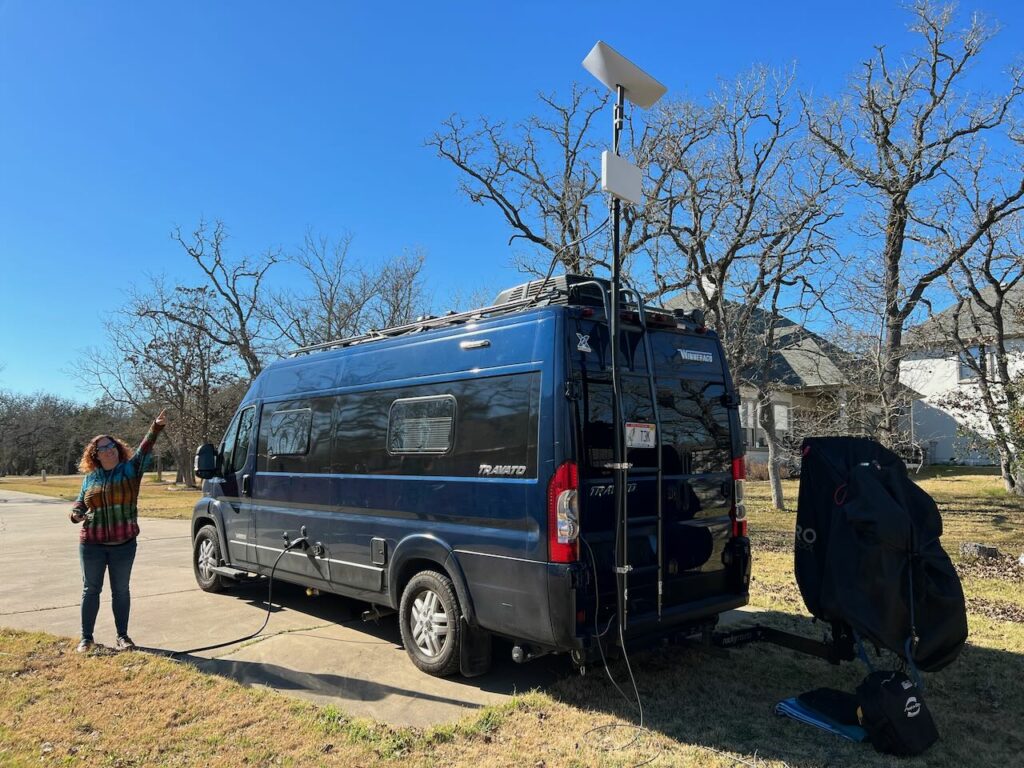
Despite all the hype, Starlink is still not without its limitations. Even Elon Musk has frequently warned that Starlink is best thought of as a compliment and not a replacement for cellular networks.
Starlink has some pricey (and bulky) equipment - receivers most commonly used by RVers cost $599 to $2500. Marine units are even pricier.
And importantly, Starlink receivers need pretty much a fully uninterrupted view of the northern sky to deliver great service and consistent reliable access. If you're camped under a beautiful canopy of trees, your Starlink connection will likely struggle, and you will likely experience some drops in service.
Starlink can also be affected by the weather, particularly heavy rains. Really strong winds can sometimes knock over your receiver.
Additionally, there are power usage considerations to keep in mind. Starlink setups can use 50 to 150 watts of power depending on your unit. If you’re not plugged into electricity at an RV park, you’ll need a robust solar or battery setup, or you may need to run your generator, just to provide enough power to run the system.
We review Starlink Hardware here.
As Starlink has expanded its coverage areas and equipment offerings, and its it has also changed its plan offerings and service features. We have a whole guide dedicated to provide Starlink information for RVers and Boaters.
At least for now, for most working nomads, Starlink may be part of your mobile internet arsenal, but probably won’t be the only connectivity tool you have onboard.
For more information:
Alternate Options
Cellular and Satellite aren't the only options that RVers and Cruisers rely on in their travels.
Here are some other options to consider as part of your arsenal:
- Co-working spaces
- Hard-wired internet at campsites
- WISPs
For more Information:
Sanity Tips
For those who rely on connectivity to maintain their lifestyle, planning your travel around connectivity is essential.
Travel Planning: Research in Advance
Before heading out to your next location, do a little (or a lot) of research in advance to understand what potential connectivity issues you might have. Checking campground or marina reviews and coverage maps can go a long way.
For More Information:
Separate Your Work Days and Your Driving Days
If you have a big deliverable, webinar, or online task - do not arrive the same day that you need to be online. It can take time to figure out which is your optimal connection in a new location, and travel days can sometimes take more time than you anticipated (traffic, delays, construction, break-downs, etc.).
Don't assume you will be ready to pop open that video chat and conference away upon arrival to a new location.
You may be greeted with an easily accessible, awesome signal. Or, you might need to play around with antennas, boosters and different carriers to find what will be the optimal choice. And of course, you might arrive to your new campground to discover your neighbors are hosting a huge reunion that is too loud to work next to, or that the front office lost your reservation.
Save yourself a lot of stress and arrive at least a day before a big work day, so you have time to work through all the redundancies you built into your setup if need be.
Leaving Room for Plan B
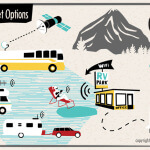
So, you've built a redundant mobile internet arsenal to meet your specific travel style and mobile work needs. You've done your research and planned around reported signal coverage and strength. You've left yourself plenty of time to set-up and test your connectivity after moving to a new location.
You've just dialed into your daily conference call on a strong, fast connection, when suddenly... nothing.
That's right, your connection has given out in the middle of your work day. Maybe you've lost power and your hotspot has shut off. Maybe the network you are on has crashed. Maybe a giant rig has pulled up next door, blocking your signal enhancers.
→ Have your back-up option accessible and ready to pop-in!
→ Always prepare clients and colleagues for your variable connectivity.
Working online while living a nomadic lifestyle is a surmountable challenge for most who are up for the preparation and flexibility required to build and maintain a mobile internet arsenal. Where there is a will, there is usually a way.
If there is one thing that we can suggest for almost everyone looking to work online while traveling: Redundancy! (And yes, we've been pretty redundant with that recommendation.)
Summary: Planning and Flexibility are Key
Working a remote job while living a mobile lifestyle is becoming more and more popular. It's important if taking this step to take into consideration your intended travel style as well as your employer's requirements.
With a little bit of advance planning and flexibility, it's definitely possible to keep your job and still be able to travel.
Additional Reading
Related Guides:
- Curated Content: Working Remotely using Mobile Internet Resources
- Tips for Travel Planning Around Connectivity for RVers and Cruisers
More Working on the Road Resources:
Here's where you can find archives of our working on the road presentations provided for various communities:
- Working Remotely with Mobile Internet - Xscapers Article
- The RV Entrepreneur - 2018 Summit
- Xscapers Webinars - Making the Connection
If you're working on the road, especially from an RV, we highly recommend both joining the Xscapers (powered by the Escapees RV Club) for tons of resources and tuning into The RV Entrepreneur Podcast for inspiring stories.
Explore the Resource Center
Have Questions?
Join our 'Library Desk':
Internet for RVers & Cruisers Facebook Group
We cross post news articles and guides, and can help point you in the right direction to our content here on the resource center.
It is with gratitude to our premium members that we're able to offer our free content - and for that, they also have access to our member Q&A areas for more in-depth guidance.
Become a Member
 The MIA is our premium membership - designed for those who consider mobile internet an important part of their lifestyle.
The MIA is our premium membership - designed for those who consider mobile internet an important part of their lifestyle.
In thanks for making content like this possible, we offer a bunch of additional perks. From interactive guidance, in-depth member exclusive content, discounts, alerts, classroom and ability to book private advising sessions.
Stay In the Know
We're constantly tracking the industry and analyzing new developments for mobile travelers. If you'd like to receive updates, we offer several ways:
- Subscribe to our free monthly newsletter
- Subscribe to our News Stories RSS Feed
- Subscribe to our YouTube Channel
- Follow our Facebook Page
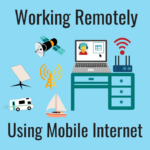
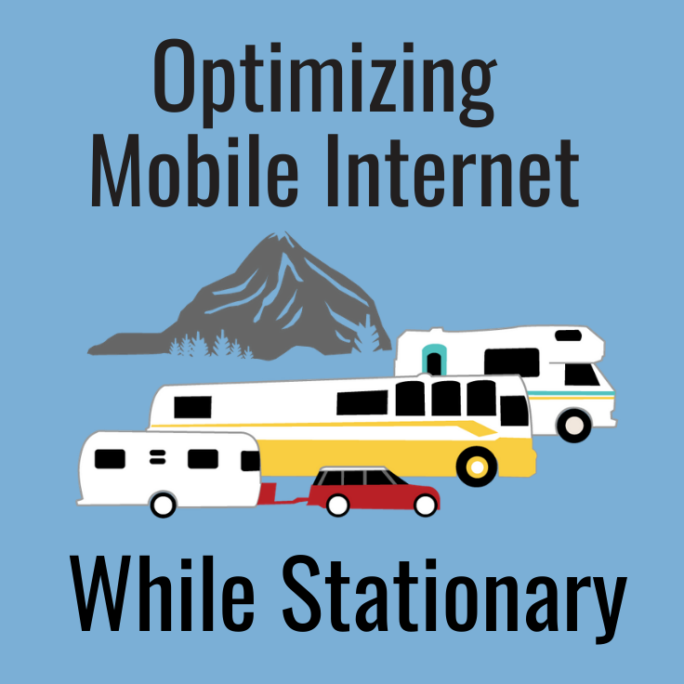
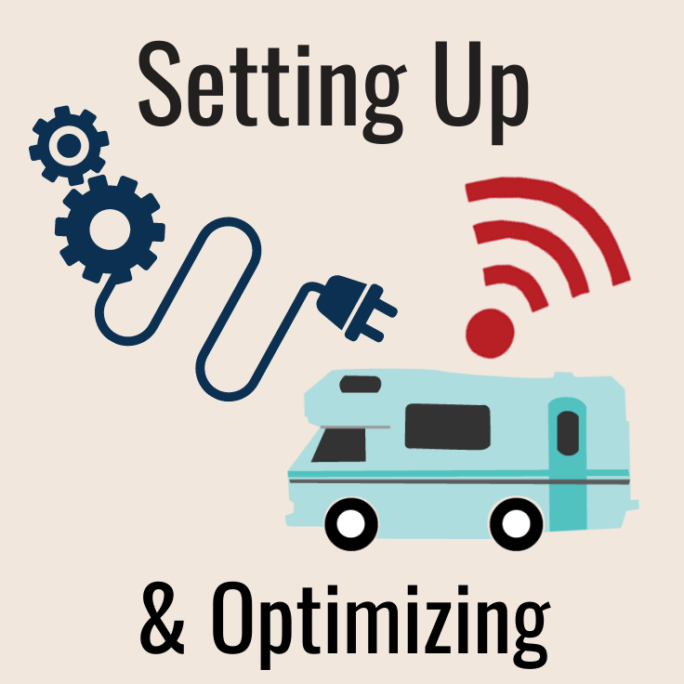
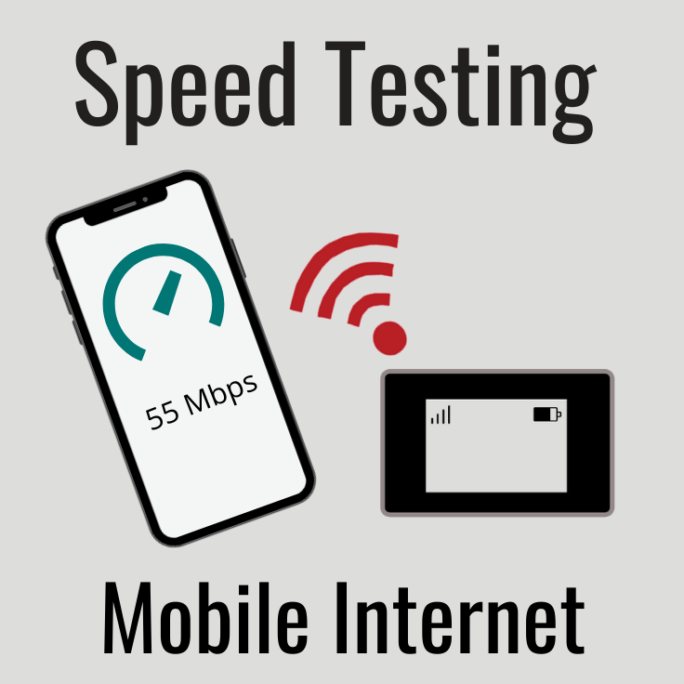


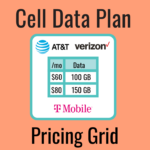
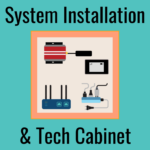
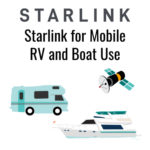

 Mobile Internet Resource Center (dba Two Steps Beyond LLC) is founded by Chris & Cherie of
Mobile Internet Resource Center (dba Two Steps Beyond LLC) is founded by Chris & Cherie of